Covid-19 and the Welsh economy – what the latest indicators tell us
22 June 2020Guto Ifan and Cian Siôn are part of Wales Fiscal Analysis, a research unit within the Wales Governance Centre at Cardiff University.
As countries across Europe tentatively emerge from lockdown, they now tread a narrow tightrope. Lift restrictions on economic and social activity too soon, and risk taking one step forwards and two steps back into lockdown. Failing to keep cases and transmission rates of the virus to low levels will also affect people’s willingness to return to pre-crisis behaviours.
Last week, the minister for the Economy, Transport and North Wales, Ken Skates warned that unemployment could reach a scale not seen in Wales for decades. Meanwhile the UK Chancellor, Rishi Sunak is said to be drawing plans for a temporary cut to Value Added Tax to stimulate consumption.
This blog post sets out what we know so far about the impact of Covid-19 on business, the labour market, and the Welsh economy, as Welsh Government lockdown restrictions are slowly eased.
Job retention and self-employment schemes
The Coronavirus Job Retention Scheme (CJRS), designed to shield firms from bankruptcy and simultaneously shore up consumer spending and tax revenues, has been a cornerstone of the UK government’s fiscal response to the crisis. In total, 316,500 employments have been furloughed in Wales up to 31 May. This amounts to 4.2% of the UK total that could be assigned geographically.
Around 25.6% of employees in Wales have been furloughed. This is lower than the proportion in the other devolved administrations and each of the nine English regions.
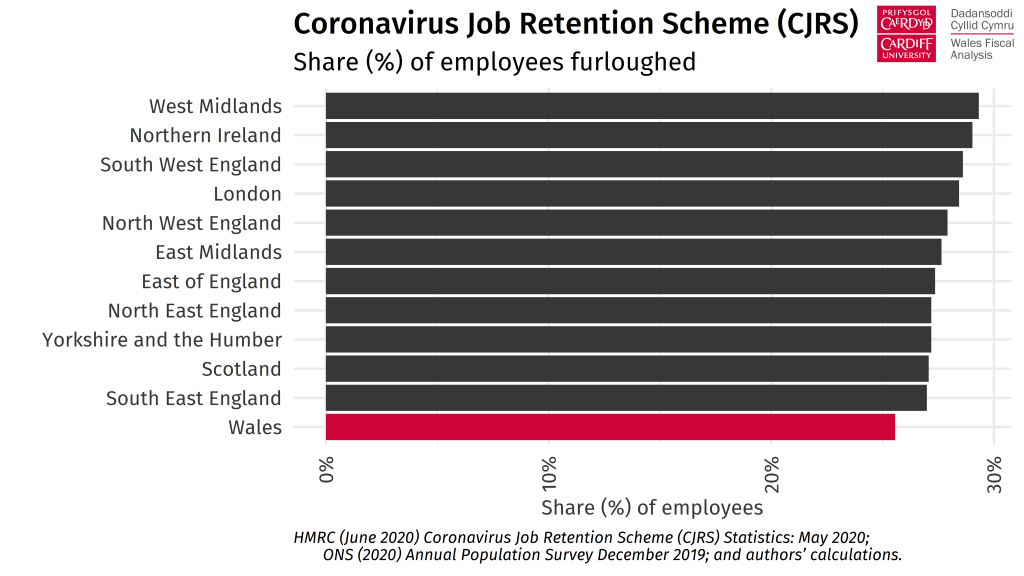
The data suggests that the lower rate of furloughing in Wales may be explained by the sectoral composition of employment compared to the rest of the UK. A higher share of Welsh employees are employed in parts of the economy most associated with the public sector (public administration and defence, education, and health and social work), which have a very low, or no share of employments furloughed across the UK.
Almost one in five of employments furloughed across the UK were in the accommodation and food services sector, despite this sector accounting for only 15% of UK employees (14% of Welsh employees). The data also suggests that furloughing has been relatively more prevalent in wholesale and retail sector as well as the manufacturing and construction sectors.
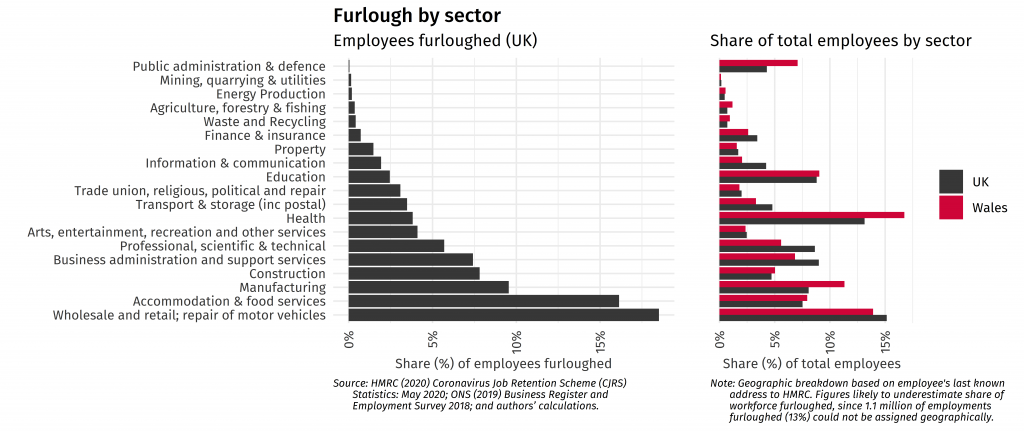
The rate of furloughing also varies by Welsh local authority. Conwy has the highest rate of employees furloughed (31%), followed by Powys, Pembrokeshire, Gwynedd, and Ceredigion (all at approximately 29%). This compares with 21% in Cardiff, 23% in Neath Port Talbot and 24% in Swansea.
The large rural areas with the highest rates of furloughed workers tend to be the most reliant on accommodation and food services, with jobs closely linked to the tourism industry.
In addition to the CJRS, around 102,000 of the estimated 140,000 eligible individuals have applied for support through the Self-Employment Income Support Scheme (SEISS) in Wales. At 73%, the take-up rate for Wales is somewhat higher than the UK average of 70%.
In total, the value of SEISS claims made by Welsh individuals up to the end of May amounted to £273 million. The average value of each claim (£2,700) is slightly lower than the UK average (£2,900), likely reflecting the higher concentration of small businesses in Wales.
The labour market
The latest labour market data shows a huge rise in the claimant count rate – the proportion of the workforce claiming Jobseeker’s Allowance or Universal Credit and are currently “searching for work”. This does not translate directly into unemployment as some of the increase will reflect people claiming universal credit on lower earnings while still in employment.
Nevertheless, the fact that the claimant count rate has already surpassed the levels reached after the 2007-08 financial crisis does not bode well for the economic recovery. And we can reasonably expect it to rise further as the CJRS (which is not included in the count) is tapered and brought to an end.
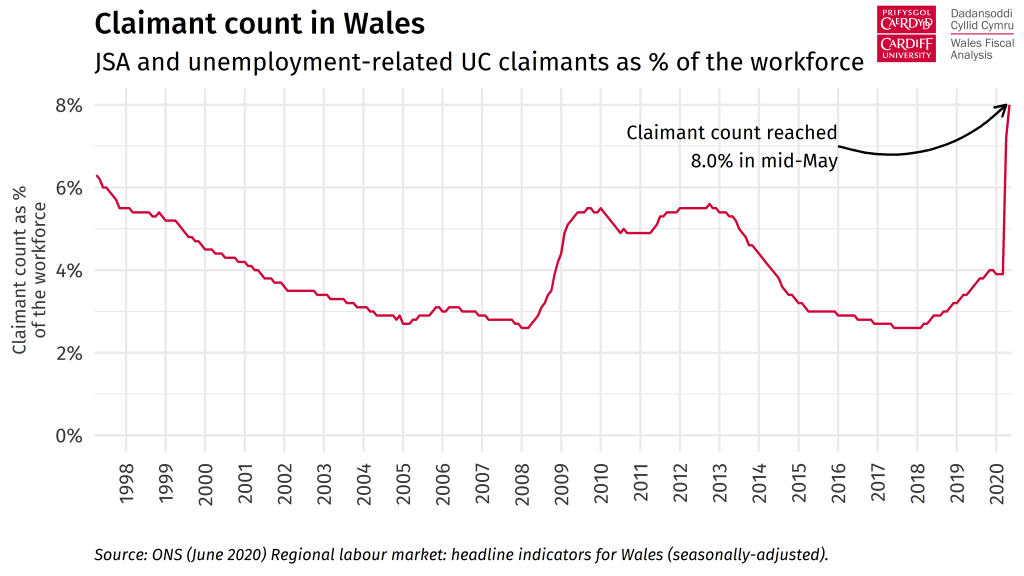
At the same time, demand for labour has plummeted. According to Adzuna, there were 15,000 fewer vacancies advertised in Wales in May compared to February – a 66% reduction.
Moreover, Covid-19 has starkly exposed the UK benefit systems’ lack of generosity to unemployed workers – one of the reasons why the UK government implemented the furlough scheme and legislated emergency changes to Universal Credit at the beginning of the crisis. In the absence of reform to out-of-work benefits, such an increase in unemployment will have desperate human consequences.
Impact on business
The Office for National Statistics’ (ONS) Business Impact of Covid-19 Survey (BICS) provides a timely indicator of the huge hit to Welsh businesses, with the latest data covering the period between 18 and 31 of May.
The share of responding businesses that had closed or temporarily paused trading has fallen slightly to 20%, from 23% at the beginning of April. Recently, a gap has started to open between responding businesses in Wales (and the other devolved nations) and England, where only 14% of responding businesses remain temporarily closed or have paused trading.
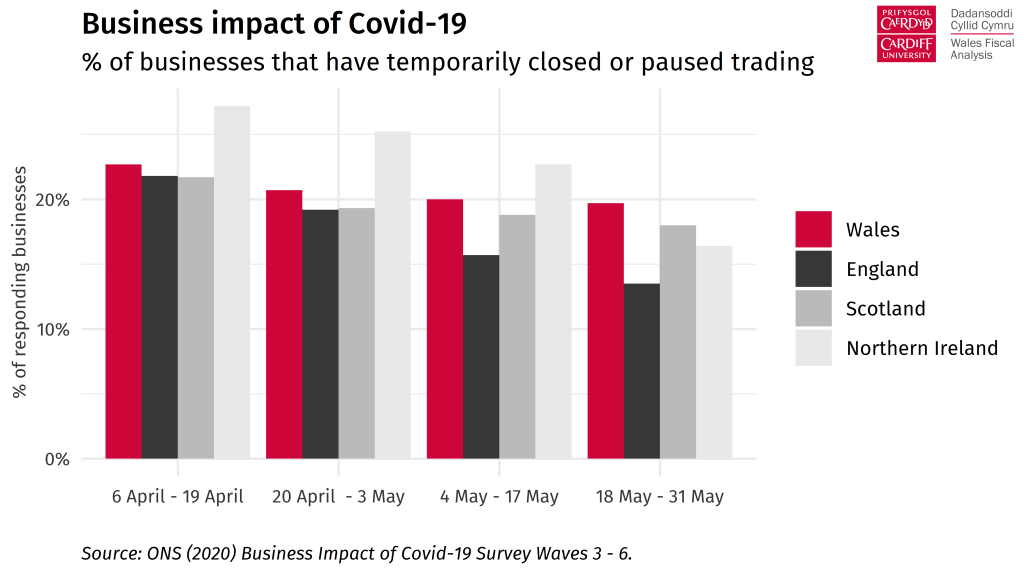
The ONS also surveys businesses on their trading intentions over coming weeks. Responses to this question suggest that the gap between Welsh and English businesses is set to narrow – 7% of responding Welsh businesses were intending to restart trading over the coming two weeks, compared to 4% in England. Still, 13% of Welsh businesses do not intend to restart trading for at least another two weeks.

The crisis has also had a large impact on the financial performance of firms that have not temporarily closed or paused trading. Some 65% of businesses that are still trading have reported a decrease in their turnover compared to what is normally expected for this time of year (similar to elsewhere in the UK), with nearly a quarter reporting a decrease of more than 50%.
It seems that being able to stay open during the pandemic has been no guarantee of normal financial performance.
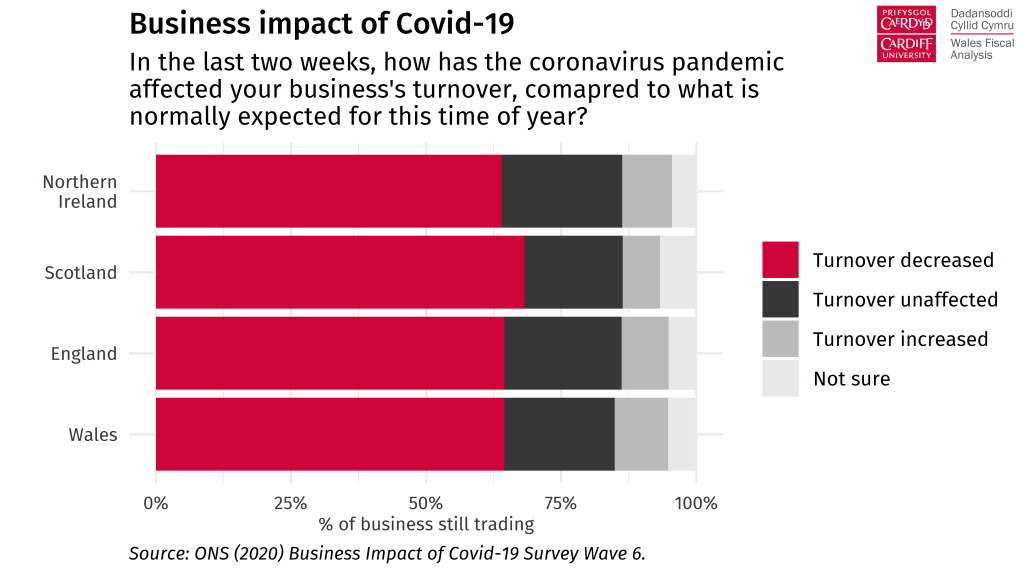
Government support for businesses
The ONS survey also sheds light on the businesses applying and receiving government support through various schemes.
By far the largest form of support for businesses was the UK government’s furlough scheme, with 81% of responding Welsh businesses reporting they had applied for the CJRS.

Almost a third of Welsh businesses reported to have applied for business grants being provided through the Welsh Government; £1.24 billion of grants for businesses were included in the Welsh Government’s 1st Supplementary Budget for 2020-21.
The £400 million of business grants being provided through the Economic Resilience Fund made the Welsh Government’s offer to businesses relatively larger than elsewhere in the UK, as evidenced by the higher rate of businesses applying for such grants in Wales.
Most grants have been provided through the non-domestic rates system, with £623 million made available for small businesses, and £214 million to retail, leisure, and hospitality businesses with a rateable value of between £12,001 and £51,000.
Some £679 million of these grants had been awarded to over 57,000 Welsh businesses up to 12 June.
A gradual reopening?
One of the most striking things during the pandemic has been the general willingness of the public to make dramatic changes to their individual behaviour to mitigate risk to others. Google Mobility Trends data provides an up-to-date indicator of the movement of people (and hence a proxy for economic activity), with the latest data covering the period up to 12 June.
This data shows that visits to shops, transit stations and workplaces were already well below their pre-coronavirus baseline, even before the lockdown announcement was made. Indeed, it seems that the public were willing to change their behaviour to accommodate risk, even when they were not explicitly instructed to do so by governments – an important point for countries that are now in the process of lifting restrictions to bear in mind.
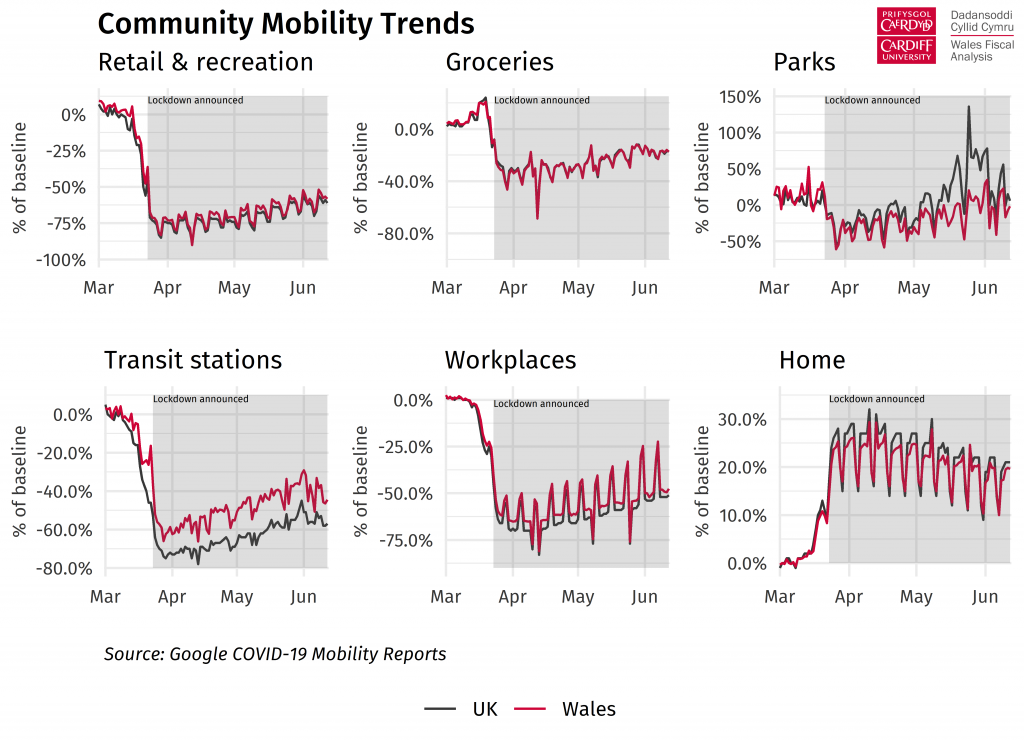
Interestingly, despite the differences in the advice provided by the Welsh and UK governments, trends in Wales have broadly followed the UK as a whole. For example, the gradual recovery in travel and visits to workplaces has been very similar in Wales and the rest of the UK. The only significant divergence appears to be the absence of a spike in travel and visits to parks (which include national parks and public beaches) in Wales over more recent weeks.
Though businesses are re-opening quicker in England, their turnover, labour demand, as well as the general mobility of people are following a broadly similar pattern across the UK. This suggests that the economic recovery will depend as much on public willingness to resume pre-coronavirus behaviours than on lockdown measures.
Research has shown that Covid-19 is already having a disproportionate impact on certain groups in society, and the economic cost of the pandemic is also likely to fall on some groups more than others. It is critical that governments factor this into their plans for emerging from lockdown and charting the economic recovery.
- December 2025
- November 2025
- October 2025
- September 2025
- June 2025
- May 2025
- March 2025
- February 2025
- December 2024
- October 2024
- September 2024
- July 2024
- June 2024
- December 2023
- November 2023
- August 2023
- February 2023
- December 2022
- November 2022
- September 2022
- July 2022
- April 2022
- March 2022
- January 2022
- October 2021
- July 2021
- May 2021
- March 2021
- January 2021
- November 2020
- October 2020
- August 2020
- July 2020
- June 2020
- May 2020
- April 2020
- March 2020
- October 2019
- September 2019
- June 2019
- April 2019
- March 2019
- February 2019
- December 2018
- October 2018
- July 2018
- June 2018
- April 2018
- December 2017
- October 2017
- July 2017
- June 2017
- May 2017
- April 2017
- March 2017
- February 2017
- January 2017
- December 2016
- November 2016
- October 2016
- September 2016
- Bevan and Wales
- Big Data
- Brexit
- British Politics
- Constitution
- Covid-19
- Devolution
- Elections
- EU
- Finance
- Gender
- History
- Housing
- Introduction
- Justice
- Labour Party
- Law
- Local Government
- Media
- National Assembly
- Plaid Cymru
- Prisons
- Reform UK
- Rugby
- Senedd
- Theory
- Uncategorized
- Welsh Conservatives
- Welsh Election 2016
- Welsh Elections